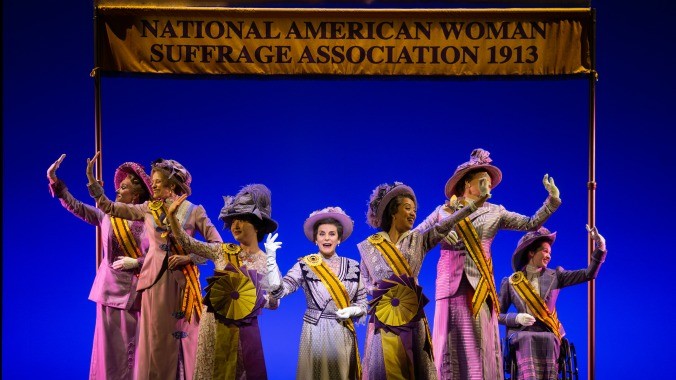‘Suffs’ Star Jenn Colella Can’t Believe the Suffrage Movement Isn’t Taught in Schools
"I had no idea what these women went through," Colella, who stars as Carrie Chapman Catt in the Tony-nominated musical, told Jezebel. "I just couldn't believe the only names I'd heard were Elizabeth Cady Stanton or Susan B. Anthony."
Photo: Joan Marcus Entertainment
“The old stiff minds must give way. The old selfish minds must go. Obstructive reactionaries must move on. The young are at the gates!” Lavinia Dock, a nurse and feminist activist, wrote in The Suffragist in 1917, just before Alice Paul and scores of suffragists picketed the White House to pressure President Woodrow Wilson into supporting the 19th Amendment. That protest would famously last months and result in a hunger strike, countless suffragettes being jailed, and ultimately, the amendment’s ratification in 1920 (though countless Black women wouldn’t be allowed to vote for nearly five decades).
Over one hundred years later, Dock’s sentiment can now be heard in the Tony-nominated musical, Suffs. Written by and starring Shaina Taub as Paul, the story follows some of the triumphs and tensions of the suffrage movement in the United States from 1913 to 1920. The fight for women’s suffrage began some 70 years earlier at the first Women’s Rights Convention in Seneca Falls, NY, led by Elizabeth Cady Stanton and Lucretia Mott. By the time Paul joined the cause, some (emphasis on some) considered her the youthful answer to an aging movement.
After decades of work, the old guard—then led by Carrie Chapman Catt, the president of the National American Woman Suffrage Association—was no closer to securing suffrage. Where Catt’s campaign asked permission (“Let Mother Vote“), Paul commanded protests. Not every woman was there, however. Black women within the movement like Ida B. Wells and Mary Church Terrell were, more often than not, cruelly shunned from much of the action. By the time the suffragists reached the White House gate in 1917, there was enough racial and generational strife to severely compromise the entire cause. Black women were justifiably tired of being told to wait their turn, and Catt and co. feared the rigor and guerrilla tactics of Paul’s wave would put a stop to any progress they’d already made.
On the night I attended Suffs, hordes of today’s youth stood together at a different gate uptown. Just two days earlier, hundreds of students at Columbia University were brutalized by a fleet of NYPD officers in riot gear and taken into custody for protesting the ongoing genocide in Gaza. For weeks, students at universities across the nation faced arrest and castigation from elder generations for supporting Palestinian liberation. Thus, several numbers—”The Young Are At The Gate,” for starters—were resonant, if not totally on the nose.
But Suffs is about as perfect as its source material. Any comparisons to Hamilton for its—sentimental and, at times, sanitized—portrayal of American feminism are earned. It’s palatable enough to be produced by Hillary Clinton and attended by Bee Shaffer (who was seated right in front of me). But even as an entry point to the history of women’s lib, there are still valuable lessons to learn. Politicians are not to be trusted; all cops are bastards; and every movement co-opted by white women will come apart as fast as it came together. But, perhaps the most critical at this point in time is that the young will always be at the gate.
In a recent phone interview, acclaimed Broadway actor, Jenn Colella—who plays Catt—spoke to Jezebel about what she’s learned from Suffs, how its message is lingering with audiences, and her character’s…complicated legacy. This interview has been edited for length and clarity.
You’ve been attached to Suffs since the beginning. What were your first thoughts after reading the script? How familiar were you with the suffrage movement in the U.S.?
Well, it was really extraordinary to read the script for the first time seven years ago and to grasp the fact that I knew nothing about the women’s suffrage movement. I just found it to be absolutely stunning that it’s not taught in schools and that it really feels like it’s been suppressed. I had no idea what these women went through. I just couldn’t believe the only names I’d heard were like, Elizabeth Cady Stanton or Susan B. Anthony. Then, as soon as I heard Shaina’s music…the feeling that I got when I was combining music with the lyrics and with this story…there are just moments sometimes when you read a new score where the hair stands up on end. You can tell that something special is going on from the very first read-through.
This show is sparking a lot of conversations—for better and for worse. What sorts of reactions are you being met with at the stage door?
-

-

-

-

-

-

-

-

-

-

-

-

-

-

-

-

-

-

-

-

-

-

-

-

-

-

-

-

-

-

-

-

-

-

-

-

-

-

-

-









































